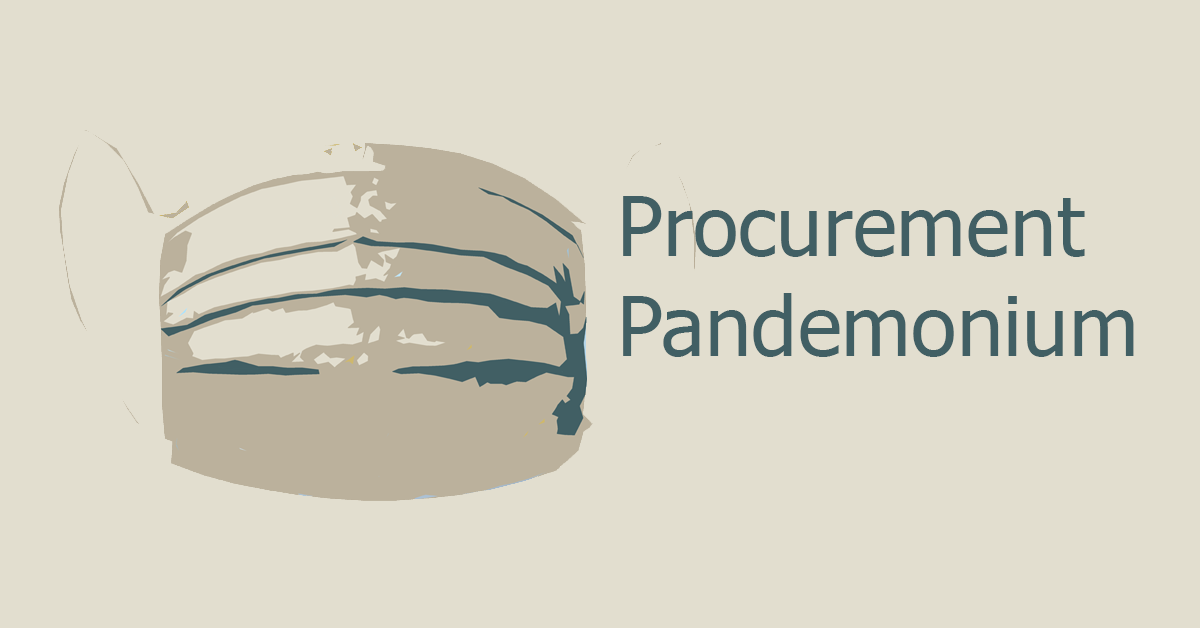
07 Apr 2022 Procurement Pandemonium
The Economist published a summary of the colossal waste of money that was created in the rush to buy PPE in the UK during the pandemic. The waste was worth it they reckon but in their assessment, they are being far too kind to the politicians.
To give an idea of how much was spent, by the beginning of this year (2022) the UK government had spent £737m just on the cost of storing the vast stocks of PPE that they had secured. This seems like a lot but when you need to understand that more than half of this – £436m – was penalties, fines for overstaying their welcome, for buying too much and having nowhere to store it. This is a shocking figure but it is just one of many indicators that describe the scale of the panic to secure sufficient supplies of safety equipment during the pandemic. It is estimated that of the 14bn items that remain unused as at March 2022, 10% will be chucked because they will pass their use by date and that is in addition to the 4bn items that were never fit for purpose when they arrived.
£737m was spent on the cost of storing the UK's vast stocks of PPE but £436m of this was penalties, fines for overstaying their welcome, for buying too much and having nowhere to store it
It is tempting to think that this all points to incompetence. Indeed when faced with the urgency and scale of the requirement for PPE to protect medical staff, carers and the general public, a certain level of panic and mismanagement is understandable. Mistakes happen at the best of times and big mistakes were always going to happen. But it would be wrong to assume that all of the mistakes were unpredictable and impossible to prevent.
Procurement professionals know that there is a balance between risk and reward. Ideally and in normal times, risk is assessed carefully and pragmatically and as much of the commercial risks as possible are passed to suppliers or offset, managed or avoided. There is a cost in doing this. The procurement process is slowed down and as the supplier takes on more risk so do they add more cost. But procurement professionals also understand urgency and when it’s necessary, normal checks are abandoned even at the risk of errors being made or unnecessary costs being incurred. In an extreme case like a pandemic, caution is thrown to the wind and it should come as no surprise that unnecessary extra costs get incurred. The scale of the mistakes and costs are in proportion to the scale of the pandemic which was, as we all know, unprecedented.
for the friends of the politicians who travelled in the VIP lane, it was no risk and all reward
While we can excuse the huge extra costs of storage and the embarrassing levels of rejects, what is less excusable is the cynical exploitation of the opportunity. In the panic, the public procurement cash safe was left wide open. It had to be because the important task of securing supplies had to fast-tracked in any way that could be imagined but while the normally securely closed doors where ajar, there were those that could see a unique combination of low risk and high reward. Given access to virtually limitless public funds, anyone could make a turn on PPE and so they did. A so-called VIP lane was opened up to allow suppliers and middle men to win government contracts without the normal levels of due diligence. A stream of quick-thinking chancers and politicians’ pals helped themselves to taxpayers’ money like a bunch petty villains who’d hit the jackpot. The normal rules of risk reward didn’t apply to them – normally high returns come with high risk – but for the friends of the politicians who travelled in the VIP lane, it was no risk and all reward. It is hardly surprising that the VIP procurement lane was found to be illegal.
It’s true that exceptional times call for exceptional measures and it was right to lower to bar for due diligence. It was also inevitable as a result that there would be mistakes, overspend and even fraud. I hope that history remembers that the procurement professionals who are ultimately responsible for these mistakes made the right calls. The mistakes were the inevitable consequence of a pragmatic decision to override most of the normal procurement rules. But we could have expected more of our politicians than to seize the opportunity to line the pockets of their friends and supporters.

